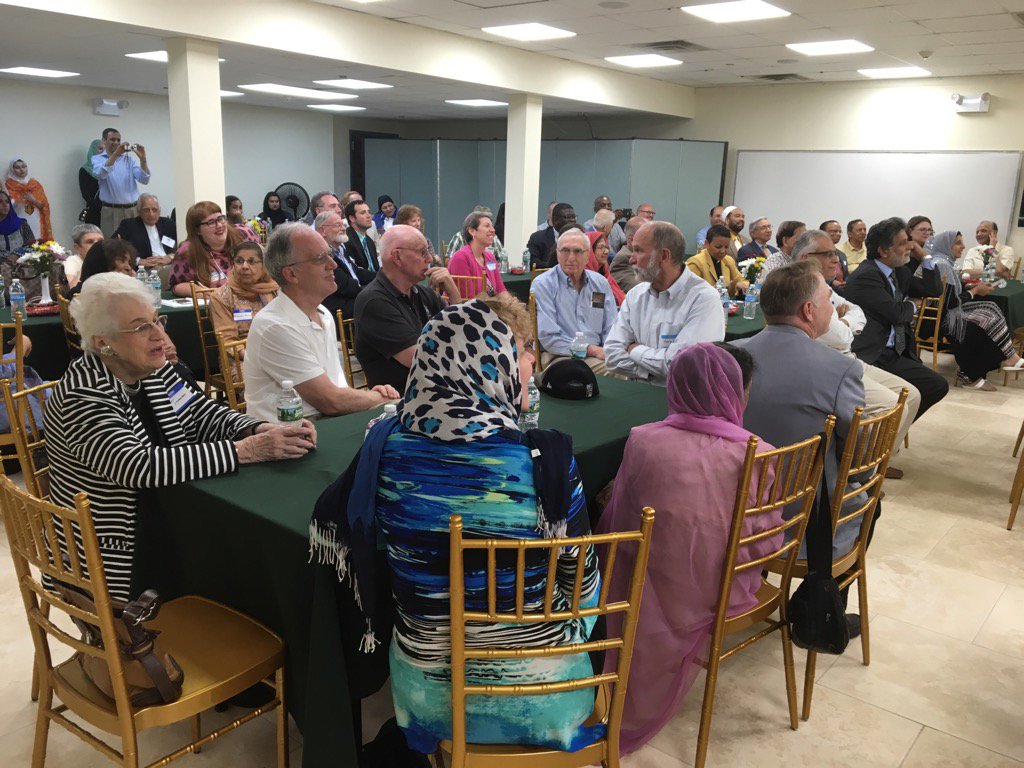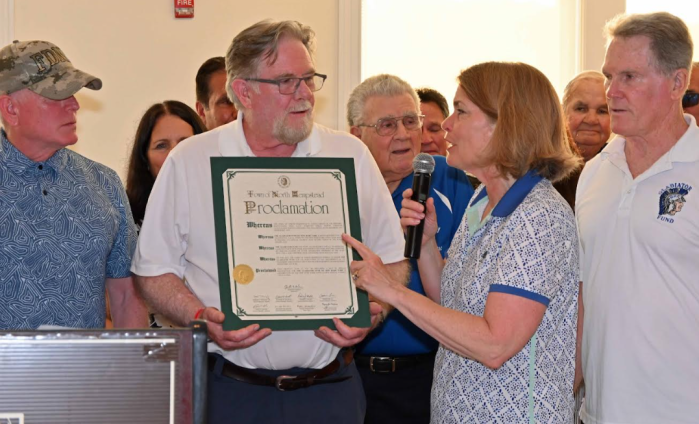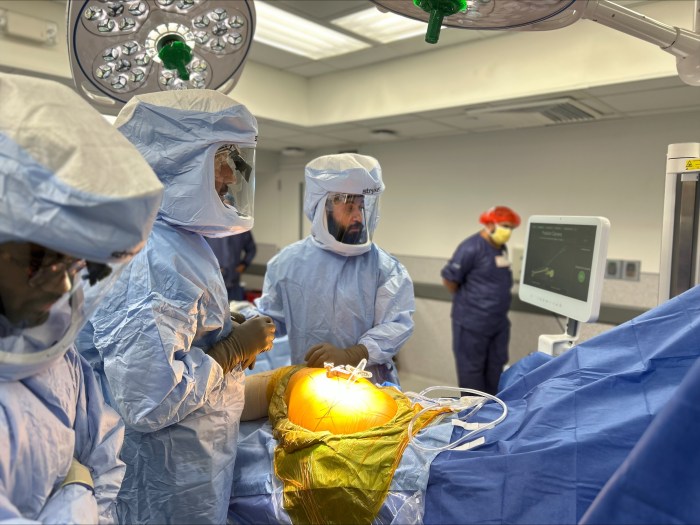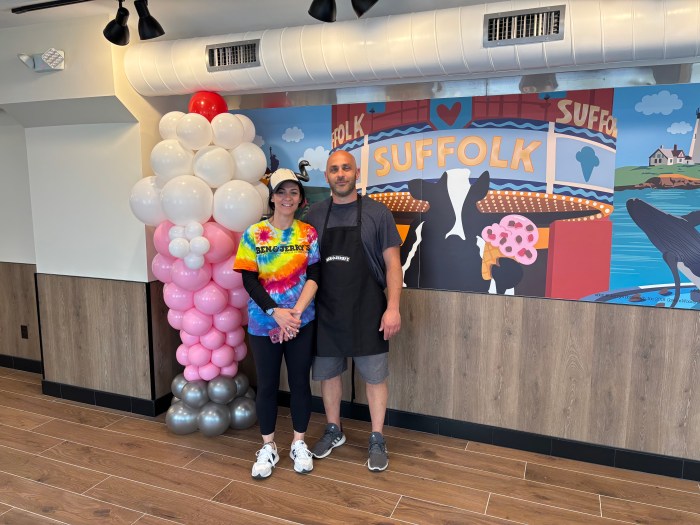The woman on the other end of the phone was rattled.
“What are we going to do?” she asked, desperately.
As a board member of the Islamic Center of Long Island in Westbury, Dr. Faroque Khan is no stranger to random phone calls from members of the community or journalists inquiring about the Muslim response to the latest attack.
“She was shaken,” Khan told the Press, recalling the moment he learned that the gunman who slaughtered 49 people at a gay nightclub in Orlando identified as Muslim.
The caller was a former ICLI board member who moved to Florida and now belongs to a mosque in the Sunshine State.
Put out a press release, Khan calmly advised. The ICLI would publish its own condemnation later that day.
“As Muslims and people of faith we must remember that God has directed us to defend all people equally against bigotry, hate, violence and abuse,” the ICLI’s statement declared. “The preservation of life is one of the main principles prescribed by the Islamic Faith.”
For a brief period before the massacre in Orlando, it seemed American Muslims had been given some reprieve.
The death of Muhammad Ali, who very publicly espoused his religion, had inspired hundreds of people to spill into the streets of his hometown of Louisville, Kentucky in honor of his life, while millions more watched from afar. Newscasters paid homage to not just a transcendent boxer, but also a man with an unwavering set of beliefs—a Muslim, whose religion served as a moral touchstone for everything he did.
In the ring, Ali had compiled 56 wins, with 37 victories coming by way of knockout. But to those who study the sport, it was Ali’s defensive ability that particularly stood out. With Ali gone, however, it’s as if Muslim Americans have had to take up the mantle as skilled defenders because they’re once again forced to respond to yet another heinous act committed in their faith’s name.
For Dr. Isma Chaudhry, president of the Islamic Center of Long Island, the brief period of genuflection for Ali seemed to portend a turning point for her religion.
But in post-9/11 America, it’s U.S. Muslims who are continuously dodging blows or being propped up as punching bags for commentators on unforgiving cable news networks amid rising nationalistic fervor buoyed by Republican presidential hopeful Donald Trump’s anti-immigrant campaign.
“The media was portraying all the positive things [Ali] had to say about community, about Islam—and very eloquently, very passionately, very sincerely,” Chaudhry told the Press, three days after the mass slaying in Orlando. “And Muslims were about to take a breather—and then ‘Boom!’ ‘Boom!’ Honestly, it’s like someone keeps smacking you on your head.”
Indeed, multiple Muslim leaders speaking to the Press in the wake of the Orlando nightclub shooting appeared exasperated, offering a common refrain: that they had seemed to be making progress fighting off stereotypes, but now realize there’s much more work to be done.
“We take two steps forwards…” Chaudhry said the day after the rampage in Florida.
Khan, a board member at the ICLI, perhaps not surprisingly, uttered the same exact phrase.
Dr. Hafiz Ur Rehman, a member of the Suffolk County Human Rights Commission, lamented: “You know, you’re back to square one.”
The latest attack to thrust Muslim Americans back into the national spotlight was the most deadly since Sept. 11, 2001, and the worst mass shooting in U.S. history.
The reaction from Trump, the presumptive Republican presidential nominee, was swift: patting himself on the back for, in his words, essentially predicting another attack perpetrated by a Muslim. He repeated his calls for a temporary ban on Muslims traveling to the United States (the shooter was born in New York) and proposed law enforcement spy on mosques.
Trump chided President Barack Obama for refusing to use the phrase “radical Islam,” suggesting Obama’s noncompliance demonstrated weakness.
Visibly irritated, Obama took aim at his detractors on Tuesday during a speech updating the administration’s efforts to “destroy” the so-called Islamic State, also known as ISIS or ISIL.
“For a while now, the main contribution of some of my friends on the other side of the aisle have made in the fight against ISIL is to criticize this administration and me for not using the phrase ‘radical Islam,’ Obama told reporters. “That’s the key, they tell us—we can’t beat ISIL unless we call them ‘radical Islamists.’
“What exactly would using this label accomplish?” he continued. “What exactly would it change? Would it make ISIL less committed to trying to kill Americans? Would it bring in more allies? Is there a military strategy that is served by this? The answer is ‘none of the above.’ Calling a threat by a different name does not make it go away. This is a political distraction.”
Obama isn’t the only president to refuse to dub terrorists who identify as Muslim “radical Islamist.” George W. Bush made it a priority not to conflate Islam with terror for the majority of his presidency. Six days after 9/11, Bush stood outside a mosque in Washington, D.C. and proclaimed, “Islam is peace.”
Authorities found no evidence that the shooter, Omar Mateen, coordinated with any terror groups, officials have said. But there were reports of ISIS sympathizers celebrating the attack.
Following days of continuous coverage of Islamic extremism, Chaudhry said Obama’s defense of law-abiding Muslim Americans was therapeutic.
“He made us so proud as Americans because American politics was going in a very different direction, it was going in a direction that was pulling us down,” Chaudhry told the Press during an interfaith Iftar dinner Wednesday night, the evening meal in which Muslims break their fast during the holy month of Ramadan.
“It was going in a direction that was depressing,” she added. “It was going in a direction where we were becoming a world mockery. What he said brings hope, brings justice, brings an identity to be proud of as Americans and I can’t thank him enough for that, I can’t thank him enough as an American.”
The Islamic Center of Long Island’s 13th annual interfaith Iftar had been scheduled prior to the vicious attack, but the tragedy weighed heavily on everyone’s mind.
In attendance were members of all faiths: Jews, Christians, Muslims. Nassau County police officers mingled with religious leaders and the mayor of Westbury, Peter Cavallaro, a Republican, offered some brief remarks.
“This is not a reaction,” Chaudhry said. “My personal view is reactions are too late. As a community we have to be proactive. We have to identify and understand each other’s concerns and that can only be accomplished when we sit together—when we sit together without an agenda. When we are not reacting to an event, that’s when we can all really come and get to know one another.”
Rev. Hank Lay of Parkway Community Church in Hicksville said this was his 10th Iftar at the ICLI.
Lay, who makes a habit of visiting the ICLI monthly, said even he put the weekend’s slaying into a “religious context, of a radical Muslim attacking a group of Americans.”
“By Monday I recognized that it was radical religion attacking a sexual group that they think is abomination,” he told the Press. “And I found on the web, Christians praising the shooter for killing these people.”
Lay said the YouTube videos have since been removed because they were considered hate speech, therefore the existence of the videos could not be independently verified. “[That] tells me the issue is not a religious issue in the sense of Islam, it was the radical fundamentalist side of many religions, including my own, Christianity, that finds sexual diversity contrary to their understanding to God and therefore has very little sympathy if they suffer because of it,” he said.
Rabbi Andrew Gordon of Temple Sinai of Roslyn told those gathered that it’s up to all religions to be more proactive if they want to end hatred.
“As we pray for God’s protection, we know that we cannot wait for God to act, we must act,” he said. “All of us: Christians, Muslims and Jews, gay and straight, black and white, young and old, all of us must join hands together. We cannot let politicians or television announcers demonize an entire religion.”
Rahman, in a separate interview, was wistful when discussing his emotions during Muhammad Ali’s funeral, which he said put the faith in a good light.
“In this particular case, the funeral of Muhammad Ali, I thought, was an excellent thing that showed…about Islam and it’s beauty, and then here comes the crazy man and knocks out 50 people,” he said. “You know, you’re back to square one and it’s horrible, it’s frustrating. It brings a bad name; it’s trying to hijack the good name of the religion.”
(Featured photo: Interfaith dinner at the Islamic Center of Long Island in Westbury on June 15, 2016.)



































